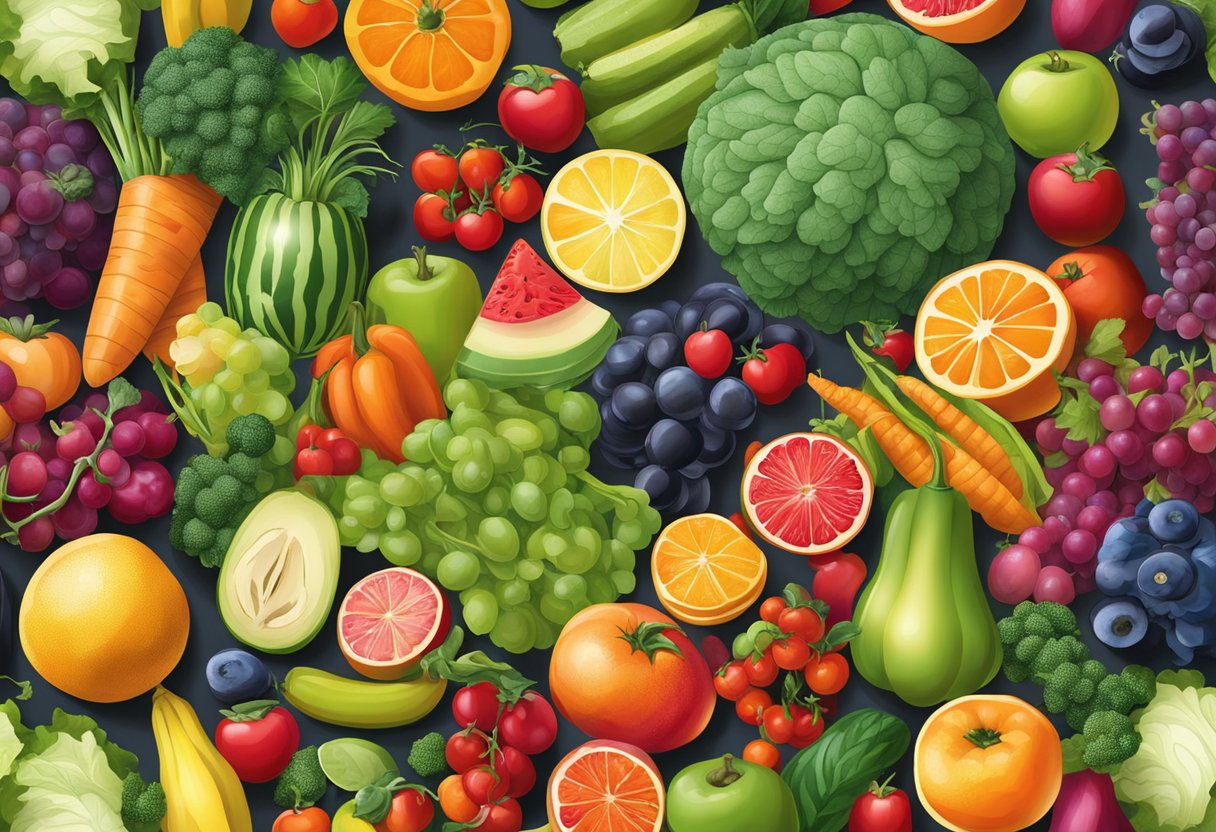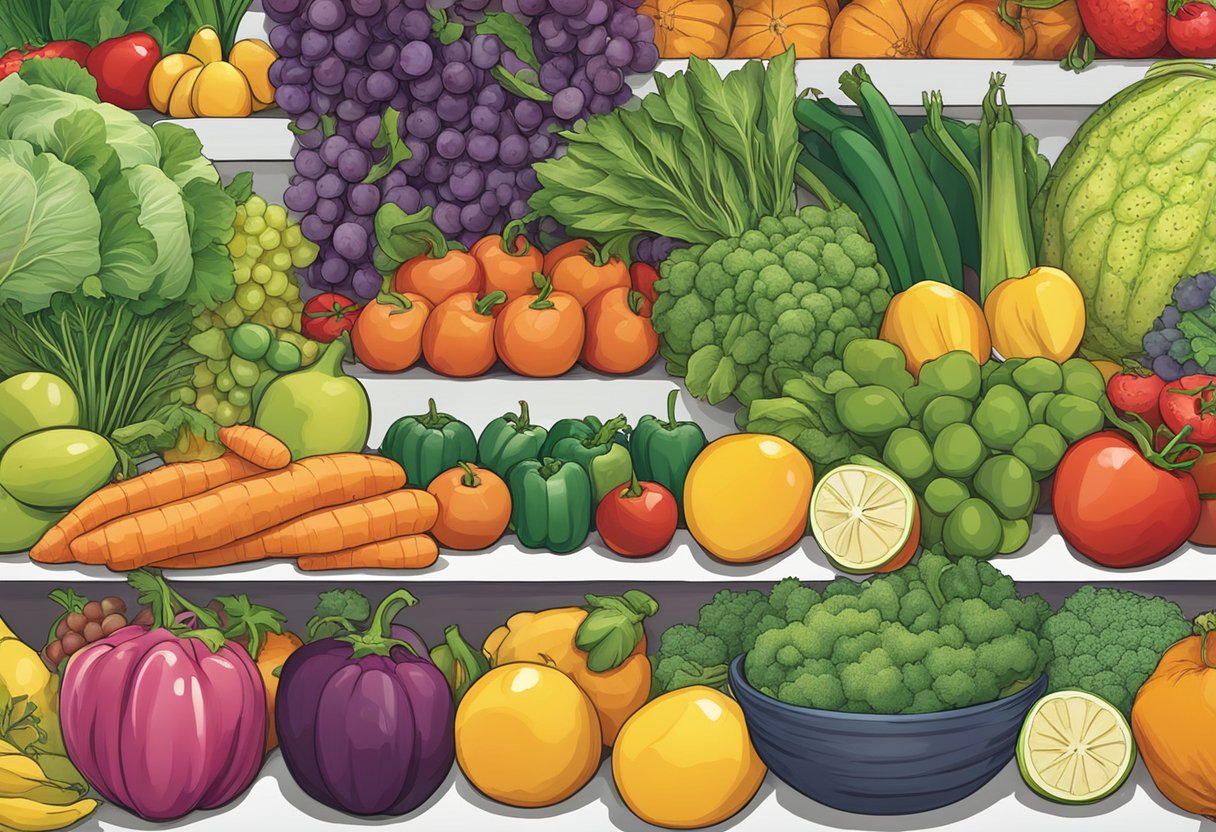The power of fruits and vegetables in our diet is undeniable. These natural foods come packed with essential vitamins, minerals, and antioxidants that are fundamental to maintaining health and preventing disease. With a wide array of nutrients such as vitamin A, B5, folate, C, E, K, calcium, iron, magnesium, manganese, and potassium, fruits and vegetables form an integral part of a balanced diet.
\Not only do they aid in the proper functioning of the body’s systems, but they also provide a source of hydration due to their high water content.

Incorporating a variety of fruits and vegetables is key for consumers who are mindful about their health and nutrition. It’s widely accepted that a diet rich in these plant foods can have positive effects on blood pressure and blood sugar levels, helping to manage appetite and energy throughout the day.
Moreover, when part of a gluten-free Mediterranean diet, they contribute to the overall nutrient density, bringing in a multitude of benefits without the gluten found in many grains that can cause health issues for some individuals. Even as we look at the kaleidoscope of colors on our plates—greens, reds, yellows, and purples—we’re not just making meals more appealing; we’re providing our bodies with the diverse phytonutrients they need to thrive.
Key Takeaways
- Plant foods supply vital nutrients critical for bodily functions.
- A diet abundant in these foods helps manage health and prevent disease.
- Fruits and vegetables enhance a gluten-free Mediterranean diet’s nutrition.
Table of Contents
Nutritional Profile of Fruits and Vegetables

Fruits and vegetables are powerhouses of nutrition, offering a range of vitamins, minerals, and other beneficial compounds. Understanding their nutritional profile can help individuals maximize their health benefits.
Vitamins and Minerals in Produce
Vegetables and fruits are vital for maintaining a balanced diet because they are loaded with an assortment of vitamins and minerals. Citrus fruits, such as oranges and grapefruits, are famous for their high Vitamin C content, which is essential for the growth and repair of tissues in the body. Vegetables like spinach and legumes are rich in iron, which is crucial for blood production. Potatoes and bananas are excellent sources of potassium, helping to maintain proper heart function and regulated blood pressure.
- Vitamin A: Found in high amounts in carrots and sweet potatoes, which promotes good vision and healthy skin.
- B vitamins: Including thiamin, riboflavin, niacin, and folate, these are plentiful in various produce and play a key role in energy production and the formation of red blood cells. For example, leafy greens are rich in folate.
Fiber: The Hidden Treasure of Roughage
Dietary fiber, found in abundance in fruits and vegetables, is the unsung hero for digestive health. Apples and pears with their skins on are especially high in this hidden treasure. Fiber isn’t just about keeping the digestive system happy — it also keeps you feeling full longer, which can help with weight management. It assists in moderating blood sugar levels, making a plate full of vegetables or a fruit a smart choice for those maintaining a gluten-free Mediterranean diet.
- Soluble Fiber: Slows down digestion and can help lower cholesterol. Examples include oranges and carrots.
- Insoluble Fiber: Aids in moving food through the digestive system and is found in high quantities in whole vegetables and fruits.
Antioxidants and Phytonutrients
Antioxidants and phytochemicals are defensive compounds found naturally in produce that help maintain your health. They ward off free radicals, which can cause damage to cells. Blueberries and strawberries are famous for their antioxidant properties. Tomatoes, with their rich red hue, owe their color to lycopene, a type of phytonutrient known for supporting heart health. These natural substances are essential components of a gluten-free Mediterranean diet, contributing to the prevention of chronic diseases.
- Lycopene: Abundant in tomatoes and helps protect against certain types of cancer.
- Flavonoids: Found in berries and apples, support cognitive function and may reduce inflammation.
Health Benefits of Regular Consumption
Incorporating fruits and vegetables into one’s diet is essential for promoting health and preventing disease. High in vitamins, minerals, and dietary fiber, these foods are key to maintaining overall wellness.
Preventing Chronic Diseases
Eating fruits and vegetables may reduce the risk of chronic diseases such as heart disease, stroke, and certain types of cancer. Studies suggest that these foods can lower blood pressure and reduce the risk of developing type 2 diabetes. An array of antioxidants and phytochemicals in fruits and vegetables plays a vital role in preventing cell damage that can lead to chronic conditions.
Weight Management and Energy Levels
Low in calories but high in fiber, fruits and vegetables help individuals feel full longer, aiding in weight management. The dietary fiber found in these foods can also have a positive impact on blood sugar levels, providing a steady supply of energy throughout the day without the spikes that lead to fatigue.
Supporting Digestive Health
Fiber-rich fruits and vegetables support digestive health by maintaining regular bowel movements and helping to prevent digestive disorders. Foods like apples, carrots, and leafy greens provide the necessary fiber to ensure proper digestive function.
Enhancing Immune Function
Fruits and vegetables contribute to a stronger immune system. They are packed with vitamins such as vitamin C and antioxidants, which help the body fight off illnesses. Regular consumption is crucial for keeping your immune system robust and responsive to pathogens.
Diverse Types of Fruits and Vegetables
Fruits and vegetables come in an impressive array of types, each with unique tastes, textures, and nutritional profiles. Inclusion of a variety of these foods is key in a gluten-free Mediterranean diet to ensure a wide spectrum of nutrients.
Leafy Greens and Cruciferous Vegetables
Leafy greens and cruciferous vegetables are essential components of the diet. Kale and spinach stand out for their versatility and dense nutrient content, including vitamins A, C, and K. Other favorites like romaine lettuce and arugula add crunch and a peppery kick to salads. Cruciferous veggies, which include broccoli and cauliflower, are known for their cancer-fighting compounds and high fiber content.
- Kale: Both curly and lacinato (dinosaur) varieties offer robust flavors and can be used in salads or sautéed as a side dish.
- Spinach: A tender leafy green perfect for salads, smoothies, or a quick sauté.
Root Vegetables and Tubers
In the root vegetable category, carrots, sweet potatoes, and turnips contribute earthy flavors and are packed with beta-carotene, fiber, and other essential nutrients. They are also naturally gluten-free, making them a staple in the Mediterranean diet.
- Sweet Potato: A versatile tuber that can be roasted, mashed, or even used in gluten-free baking.
- Carrot: Crunchy when raw, sweet when cooked; carrots are ideal for snacking or adding sweetness to dishes.
Berries and Citrus Fruits
Among fruits, berries and citrus bring a burst of flavor and vitamin C to the diet. Strawberries and blackberries are rich in antioxidants, whereas citrus fruits like lemons, limes, and oranges not only enhance flavors in dishes but also provide essential vitamins.
- Berries: Small but mighty, they are great in cereals, smoothies, or as a fresh snack.
- Citrus: Add to water, salads, or squeeze over cooked dishes to enliven flavor without adding gluten.
Through the varied colors and textures, the diverse types of fruits and vegetables play a crucial role in a well-rounded gluten-free Mediterranean diet, delivering vital nutrients and enhancing the enjoyment of meals.
Incorporating Fruits and Vegetables into the Diet
A gluten-free Mediterranean diet focuses on foods that are naturally rich in nutrients like fruits and vegetables. They provide key health benefits and are essential for a balanced diet, serving as major sources of vitamins, minerals, fiber, and antioxidants.
Creative Cooking and Preparation
When it comes to cooking and preparing fruits and vegetables, one can be quite inventive. They might try making zucchini noodles as a pasta substitute, which is both a healthy and flavorful option. Zoodles can be topped with a robust tomato sauce packed with more veggies. For an added touch, grilling fruits such as peaches or pineapples can bring out their natural sweetness, making them a delightful side dish or dessert.
Meal Planning and Recipes
Strategic meal planning is crucial for integrating more fruits and vegetables into one’s diet. One could start their day with oatmeal topped with berries and sliced apples, ensuring they get their daily dose of fiber and essential nutrients. For lunch, a vibrant salad with a variety of leafy greens, like spinach or kale, tossed with colorful bell peppers and cucumbers can provide a high dose of vitamins and minerals along with much-needed protein.
Understanding Nutrient Density
Nutrient density is a term that refers to the amount of nutrients a food contains relative to the number of calories it provides. Foods high in nutrient density offer more vitamins, minerals, and other beneficial compounds compared to their calorie count.
Identifying Powerhouse Fruits and Vegetables
Powerhouse fruits and vegetables stand out due to their high nutrient density. These foods provide substantial levels of essential nutrients while being relatively low in calories. They are key components of a balanced, gluten-free Mediterranean diet, which emphasizes the importance of a variety of fruits and vegetables for maintaining health. Typically, these items include a range of green leafy vegetables, fruits, and other vegetables widely recognized for their health benefits.
Green Leafy Vegetables: These are typically high in vitamins A, C, and K, as well as minerals like iron and calcium. Examples include:
- Spinach
- Kale
- Swiss chard
Cruciferous Vegetables: Renowned for their nutritious profiles, these vegetables are not only rich in vitamins but also contain compounds that may support health in multiple ways. They include:
- Broccoli
- Brussels sprouts
- Cauliflower
- Cabbage
Each serving of these vegetables contributes to the daily nutritional requirements without adding excessive calories. Incorporating a variety of these powerhouse fruits and vegetables into daily meals is a strategic way to boost nutrient intake, especially important in a gluten-free Mediterranean diet where food variety ensures comprehensive nutrition.
Risks and Considerations
While fruits and vegetables are essential for a healthy diet, there are certain risks and considerations one should keep in mind, especially concerning pesticides and potential food allergies.
Pesticides and Organic Produce
Consuming fruits and vegetables is vital to maintaining health, but it’s important to consider the presence of pesticides. These substances are often used in conventional farming to protect crops from pests and diseases. However, they can pose risks when residues remain on produce. To minimize these risks, many people opt for organic produce, which is grown without synthetic pesticides or fertilizers. The Environmental Working Group provides a list known as the “Dirty Dozen,” which highlights fruits and vegetables with the highest level of pesticide residues, suggesting which items to buy organic.
Food Allergies and Intolerances
Another consideration when consuming fruits and vegetables is the possibility of food allergies or intolerances. These might manifest as mild to severe reactions, affecting one’s health. For example, someone adhering to a gluten-free Mediterranean diet might experience discomfort when consuming certain products if they have not been properly identified as gluten-free. It’s crucial for individuals with allergies or intolerances to identify and avoid triggers to maintain their well-being.
Conclusions and Recommendations

Incorporating a diverse range of fruits and vegetables into one’s diet significantly contributes to improved health and nutrition. It is recommended that for each meal, half of the plate should consist of fruits and vegetables. These foods are low in energy but high in vital nutrients and dietary bioactives.
- For Health: A diet rich in fruits and vegetables can help lower blood pressure, reduce risks of heart disease and stroke, and may help with blood sugar regulation.
- In Schools: Nutrition education programs can be a great investment. They have a high cost-benefit ratio and are vital for teaching young people about healthy food choices.
When adhering to a gluten-free Mediterranean diet, it is beneficial to choose naturally gluten-free fruits and vegetables as the cornerstone of meals. These foods are integral for providing essential vitamins, minerals, and fiber, without the need for gluten-containing grains.
Fruits and veggies should be enjoyed in their whole form when possible, which ensures that one receives the full spectrum of their benefits. For example, the skin of an apple contains fiber while orange segments are full of vitamin C.
It is also advisable to consume a variety of colors in fruits and vegetables as each color often signifies different nutrients. For instance, leafy greens are typically high in vitamin K, while orange and yellow vegetables are rich in vitamin A.
To implement these recommendations, one can start by adding vegetables to their favorite dishes, snacking on fruit, or trying a new vegetable recipe each week. It is these small, consistent changes that lead to lasting health benefits.
Frequently Asked Questions

Dietary inclusion of fruits and vegetables offers myriad health benefits. These range from physiological improvements to mental health enhancements, demonstrating the significant roles fruits and vegetables play in a well-rounded gluten-free Mediterranean diet.
What are the top health benefits of including fruits and vegetables in daily diet?
Fruits and vegetables are fundamental in the Mediterranean diet for their ability to lower blood pressure and reduce the risk of chronic diseases. The fiber content found in these foods is vital for digestive health.
How do fruits and vegetables enhance overall well-being?
Regular consumption of fruits and vegetables is associated with better weight management and increased energy levels. They provide essential vitamins and minerals necessary for the body to function optimally.
What changes occur in the body with regular consumption of fruits and vegetables?
The body experiences a positive shift in blood sugar levels with regular intake, which can help control appetite and prevent overeating. Additionally, the antioxidants in fruits and vegetables can support cellular health.
In what ways do fruits and vegetables contribute to disease prevention?
They have been shown to play a role in preventing heart disease and certain cancers, mainly due to their high antioxidant content. These antioxidants fight off oxidative stress, which is linked to various chronic conditions.
How can a diet rich in fruits and vegetables impact mental health?
Consuming a variety of fruits and vegetables may contribute to improved mental health, as these foods can affect neurotransmitter synthesis and brain inflammation, which in turn influence mood and cognitive processes.
What are the nutritional strengths of fruits compared to vegetables?
Fruits generally contain higher amounts of natural sugars and vitamins useful for immediate energy, whereas vegetables often offer more minerals and lower-calorie options beneficial for long-term health and maintaining a balanced gluten-free diet.


